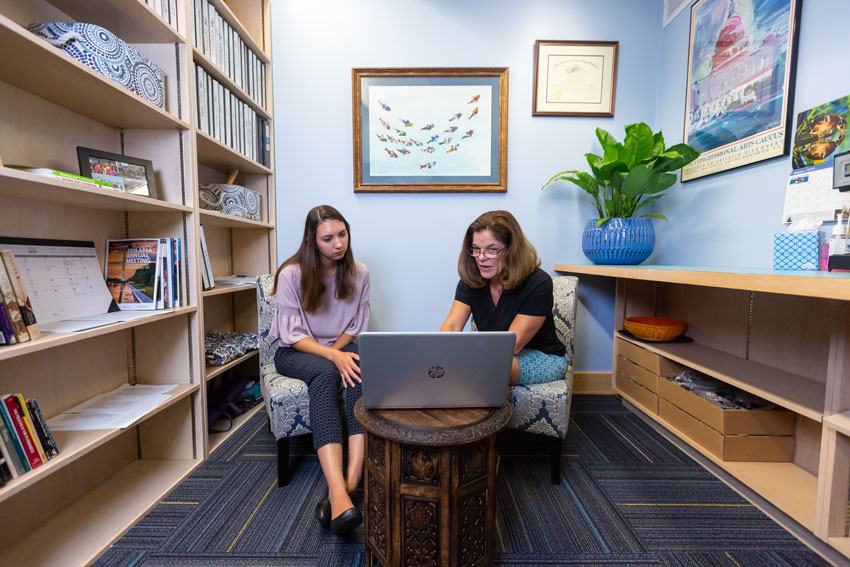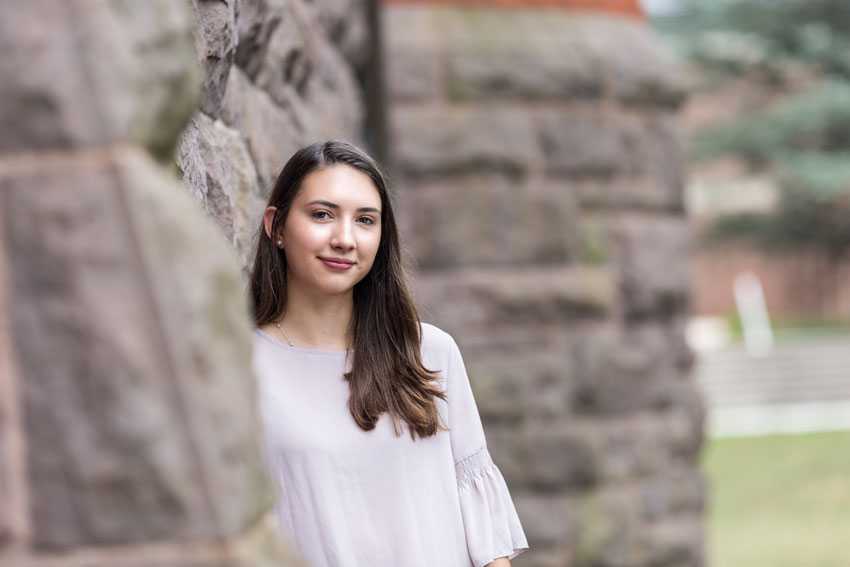The daughter of a Berks County police officer, Haley Shultz ’21 spent many days shadowing her dad in local courthouses when she was growing up. Now a public policy and political science double major, she believes these early-on experiences nurtured her passion for social justice issues, especially within the criminal justice system.
Shultz was excited to return to the courts as a Kolbe Fellow this summer, and this time around, her dad shadowed her as she explored the origin of issues that exist in several Veterans Treatment Courts in Pennsylvania. Alongside Public Policy Prof. Anne Douds, she worked to develop action items to improve the courts’ current processes.
“I learned about problem-solving courts through a previous internship I had with a Gettysburg alum, and finally being able to do my own research in the courts because of an idea my professor shared with me has been a nice full circle moment for me,” Shultz said.
Douds is a former trial lawyer and policy consultant. In 2013, as a result of her years of experience working with problem-solving courts—courts that address underlying issues that could contribute to criminal activity, in this case, for veterans—she began researching how the court system treats both criminals and victims. Relatively new to Pennsylvania after having first opened in 2009, Veterans Courts focus on supplying veterans with support and treatment of underlying issues within a criminal justice setting, such as substance abuse and combat-related mental illnesses.
While Veterans Courts have clear benefits to society such as reducing repeat offenders, Douds made a concerning observation about victim rights within these courts, which is now the focal point of Shultz’s research. Due to the priority of veterans’ healing in these courts, the healing of victims has at some point fallen to a lesser priority, and this strays from the general intent of courts to respect the rights of both defendants and victims of crime.
“Having been a victim advocate and having represented victims in the criminal justice system before, I noticed as I was observing these court proceedings that there were no victims involved,” Douds said. “I never once in three years of observation saw a victim participate.”
Douds shared this research idea with Shultz after noticing her strong writing skills and natural advocacy for social justice issues in class. Being awarded a Kolbe Fellowship allowed Shultz the opportunity to explore her interest in courts beyond the realm of what she already knew.

She dove into federal and state level crime victims’ rights documents, the local rules, policies, and procedures of every county in Pennsylvania that had a Veterans Court, and participant handbooks for those that had one. She also visited four Veterans Courts within the state where she observed hearings firsthand, and interviewed court officers and staff.
The research that Shultz conducted has supported Douds’s initial findings.
“There are legal rights—federal and state—that victims have, that are supposed to be applied to all courts of law. But what I found is those legal rights are not being fulfilled all of the time,” Shultz said. “There’s definitely variance between the courts. They all apply laws quite differently, and to different levels. And it’s a problem if the law is being applied differently in different parts of the state.”
While it may be quick to assume that negligence is the cause of discrepancies within Veterans Courts, Shultz’s research helped her understand that because veterans serve as the natural focus of these courts, many are struggling to figure out how to balance the needs of the veterans and the victims, to ensure that they both receive the attention they need.
“I think Haley has learned that just because people are doing something they shouldn’t be doing, or they’re not doing something they should be doing, they’re not necessarily doing it on purpose. They can be coached and they can be educated to bring their behavior into compliance with the law,” said Douds.
Beyond the uncertainty of best practices among court coordinators all the way up to district attorneys and judges, a more widespread issue appears to be a lack of general knowledge. In addition to being a police officer, Shultz’s dad, Scott Shultz, is a veteran. He offered a unique perspective when he observed a Veterans Court hearing for the first time, with his daughter.
“There are a lot of people out there who don’t know [these courts] exist. I work at Berks County, and I didn’t know that they had a Veterans Court,” he said. “When Haley started doing this work, I found out that they do have one. I know the district attorney who was in charge of that well, and even I was not aware he was running the Veterans Court program.”
According to Shultz’s findings, the unawareness surrounding Veterans Courts is widespread in Pennsylvania. Police officers typically serve as the initial points of contact who recommend nontraditional courts to victims, so spreading awareness of what these courts are and the benefits they bring to the community to police officers like her dad, and all individuals beyond the criminal justice system, is a top priority for her.
“It made me realize just how important it is for me to simply do this research and get the word out that they exist, and how they’re impacting society,” Shultz said.
 Spreading awareness by word of mouth and potentially presenting her student-faculty research at an Academy of Criminal Justice conference in March are not Shultz’s only action items. She also plans to distribute a document to all Veterans Courts in Pennsylvania that will provide an overview of her findings and propose changes like developing a universal policy manual, applying a restorative justice model to the courts, and including a victim advocate in Veterans Courts’ teams.
Spreading awareness by word of mouth and potentially presenting her student-faculty research at an Academy of Criminal Justice conference in March are not Shultz’s only action items. She also plans to distribute a document to all Veterans Courts in Pennsylvania that will provide an overview of her findings and propose changes like developing a universal policy manual, applying a restorative justice model to the courts, and including a victim advocate in Veterans Courts’ teams.
While both Shultz and Douds agree that the shortcomings in Pennsylvania Veterans Courts have gone too long without being addressed, they are hopeful their research will serve as a source of momentum to change the course of existing Veterans Courts and will foster expansion of these courts across the state, so that they may widely and consistently advocate for not only the needs of veterans, but also the needs and rights of veteran crime victims.
Learn more about how students at Gettysburg College are paving the way to positive impact and social change through programs such as the Kolbe Fellowship and the Eisenhower Institute Undergraduate Fellowship.
Originally posted on the Gettysburg College website
Article by Molly Foster
Contact: Carina Sitkus, director of communications and content strategy, 717.337.6803